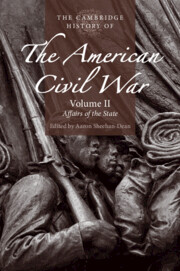Book contents
- The Cambridge History of the American Civil War
- The Cambridge History of the American Civil War
- The Cambridge History of the American Civil War
- Copyright page
- Contents
- Contributors to Volume II
- Note on the Text
- Part I Causes
- Part II Managing the War
- Part III The Global War
- Part IV Politics
- 18 Radicals and Republicans
- 19 Northern Democrats
- 20 Confederate Politics
- 21 Lincoln and the War
- 22 Peace and Dissent in the North
- 23 African American Political Activism
- 24 Davis and the War
- 25 Peace and Dissent in the South
- Index
- References
21 - Lincoln and the War
from Part IV - Politics
Published online by Cambridge University Press: 11 October 2019
- The Cambridge History of the American Civil War
- The Cambridge History of the American Civil War
- The Cambridge History of the American Civil War
- Copyright page
- Contents
- Contributors to Volume II
- Note on the Text
- Part I Causes
- Part II Managing the War
- Part III The Global War
- Part IV Politics
- 18 Radicals and Republicans
- 19 Northern Democrats
- 20 Confederate Politics
- 21 Lincoln and the War
- 22 Peace and Dissent in the North
- 23 African American Political Activism
- 24 Davis and the War
- 25 Peace and Dissent in the South
- Index
- References
Summary
On his way to his inauguration in Washington, DC, in February 1861, Abraham Lincoln stopped at Independence Hall in Philadelphia to raise a flag. “I have never had a feeling politically that did not spring from the sentiments embodied in the Declaration of Independence,” he told the assembled crowd. The president-elect went on to say that the Declaration was not written merely to justify the separation of the colonies from Great Britain, but to give “liberty, not alone to the people of this country, but hope to the world, for all future time. It was that which gave promise that in due time the weights should be lifted from the shoulders of all men, and that all should have an equal chance. This is a sentiment embodied in that Declaration of Independence.” Lincoln continued that if the nation could not be saved on the basis of the Declaration, it would be “truly awful.” And, as he was speaking off the cuff, he said, “I was about to say I would rather be assassinated on this spot than surrender it.”
- Type
- Chapter
- Information
- The Cambridge History of the American Civil War , pp. 436 - 460Publisher: Cambridge University PressPrint publication year: 2019

